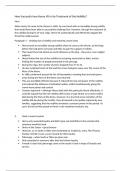Essay
Essay Plan: How Successful was Henry VII in his Treatment of the Nobility?
- Course
- Institution
This is a detailed essay plan on the subject of Henry VII and the Nobility. This plan details key examples to support each argument and draws a judgment for each point, as well as including a written introduction and conclusion. This essay plan helped me to achieve 16/20 for this essay.
[Show more]



